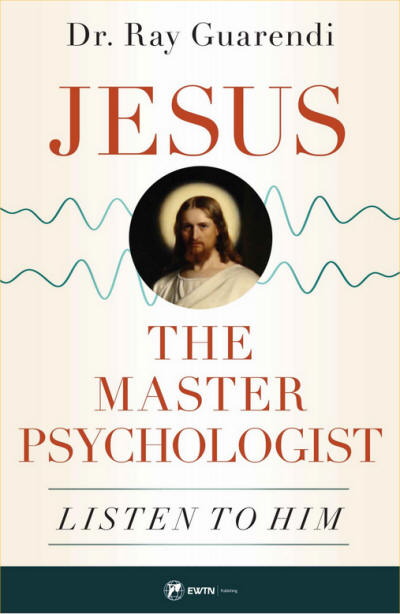Catholic Medical Quarterly Volume 71(4) November 2021
Book Review
Jesus The Master Psychologist. Listen To Him
by Dr. Ray Guarendi. EWTN Publishing, INC.
Reviewed by Dr Pravin Thavasathan
 It
is much easier to be a psychiatrist than a psychologist these days. The
role of a psychiatrist is to diagnose and treat severe mental illness. The
days when psychiatrists made observations about how people should live
their lives are long gone. That is not their role. That is why I always
ask people to seek competent medical help and not Catholic help if they
are suffering from mental illness. Much the same may be said about
psychology.
It
is much easier to be a psychiatrist than a psychologist these days. The
role of a psychiatrist is to diagnose and treat severe mental illness. The
days when psychiatrists made observations about how people should live
their lives are long gone. That is not their role. That is why I always
ask people to seek competent medical help and not Catholic help if they
are suffering from mental illness. Much the same may be said about
psychology.
But what about helping people who are asking deeper questions about how to live their lives? In such matters, Catholics should seek help from Catholic professionals. An excellent way to do so is to read this book. Dr Guarendi is a clinical psychologist and a Catholic. He reminds us that there is no conflict whatever between what good psychology teaches and what the Gospels tell us. In this work, he examines a number of emotions that afflict us. How do we overcome anger or jealousy? What does it mean to turn the other cheek? How do we deal with some common problems in children?
Let us examine self-esteem. A certain kind of assertiveness training might lead us away from the virtue of humility. But our sense of self-worth does not come from ourselves, says the author. It comes from our awareness that we are sons and daughters of a Father who loves us. Meekness and self-esteem are thus in perfect harmony with each other. " Whoever you are, whatever you possess, however well others think of you, know it all originates from above."
What about humility? Dr Guarendi reminds us that it has nothing to do with feeling insecure. Humility is reality. It is awareness of one's weakness, failures and sins. It also has to do with gratitude. Al the good things we do come from God. All is grace.
Psychology has discovered forgiveness therapy. Christianity knew about it long before. It is there in the Lord's Prayer. A lack of forgiving leads to psychological problems: "mentally rehearsing hurts and pondering reprisals is not good for the soul." It destroys peace.
The author refers to "mouth Control." In the Catholic tradition, it refers to sins of the tongue: "getting a grip on one's mouth is a prime aim for the Christian." What about sinful anger? We claim that we cannot help the way we feel. But feelings that come from thoughts can be controlled. The author writes well on the healing powers of confession.
The overall message of this excellent book is that there is no conflict between psychological insights and the teachings of the Catholic Church.
